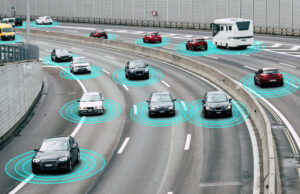
Consumers want more advanced, autonomous safety features, survey says
By onAnnouncements | Technology
The National Highway Traffic Safety Administration (NHTSA) has made it clear that it wants more safety technology in vehicles and a new survey shows consumers do as well.
The Autonomous Vehicles: Consumer Trends and Attitudes Survey found that advanced driver-assistance systems (ADAS) are consumers’ top priority when choosing their next car.
Ghost Autonomy, an autonomous driving software company, surveyed 1,200 participants across diverse age groups, income levels and geographical regions for the survey.
Eighty percent of respondents said safety systems played a pivotal role in their choice of vehicle and 61% said they’d accelerate their next purchase for breakthrough safety technology.
The survey was released just weeks after the Insurance Institute for Highway Safety (IIHS) and NHTSA announced that 20 automakers met a 2016 commitment to equip nearly all the light vehicles they produce in the U.S. market with automatic emergency braking (AEB).
The automakers agreed to equip at least 95% of their vehicles up to 8,500 pounds with AEB by the end of their production year that ended Aug. 31, a release from IIHS said. The AEB is required to slow the vehicle by 10 mph in one of two tests conducted at 12 and 25 mph or by five mph at both speeds.
General Motors, Jaguar Land Rover, Maserati, Porsche and Kia completed their commitment in 2023. Audi, BMW, Ford/Lincoln, Honda/Acura, Hyundai/Genesis, Mazda, Mercedes-Benz, Mitsubishi, Nissan/Infiniti, Stellantis, Subaru, Tesla, Toyota/Lexus, Volkswagen and Volvo completed the commitment in previous years.
“Car buyers today will find that almost any new vehicle they buy comes standard with a city-speed AEB system, typically with pedestrian detection. This is significant progress, and it sets the stage for the strong federal safety standards that have been proposed,” said William Wallace, associate director of safety policy for Consumer Reports, which monitored the pledges.
NHTSA also proposed that all passenger vehicles, trucks and buses with a gross vehicle weight rating of 10,000 pounds or less have AEB. If, adopted, the AEB would be required to avoid a crash with another vehicle at up to 50 mph. Automakers would have a four-year grace period from the date of adoption.
Another NHTSA proposal would mandate AEB on vehicles more than 10,000 pounds. The AEB would be required to prevent crashes with other vehicles.
“IIHS expects the voluntary commitment to prevent 42,000 crashes and 20,000 injuries by 2025,” the release said. “The estimate is based on IIHS research that found that front crash prevention systems with both forward collision warning and automatic emergency braking cut rear-end crashes by half.”
A recent study by IIHS said front crash prevention systems aren’t as effective at preventing collisions with large trucks and motorcycles as they are at avoiding crashes with cars.
Systems, such as collision warning and AEB, were found to reduce rear-end crashes by 53% in cases involving other passenger vehicles; they reduce such accidents by just 38% in situations involving medium or heavy-duty trucks, IIHS said. For passenger vehicle crashes involving motorcycles, they reduce the accident rate by 41%, the studies showed.
While IIHS expects AEB to reduce crashes overall, there are safety concerns when advanced driver assistance systems (ADAS), such as AEB, are damaged.
Many drivers recently surveyed by IIHS said they’ve had issues with the technology after repairs. It is not quantified to what degree insurance claims may factor into the quality of repair, but diagnostic companies have indicated that claims cost mitigation efforts, insurer pushback and failure to prioritize adherence to OEM procedures can be a contributing factor.
Ghost Autonomy’s survey found consumers don’t only want autonomous features, they want to purchase a fully autonomous vehicle (AV), if it is proven safe. Sixty-five percent of respondents said they’d want fully autonomous driving in the next 10 years.
Seventy-seven percent of respondents also wanted to own an autonomous vehicle versus using an autonomous taxi or rideshare.
Next generation respondents were the most interested with 79% of respondents between the ages of 21 and 29 and 75% of survey takers between the ages of 30 and 39 saying they want a fully AV, if safe.
Fifty-nine percent of respondents with previous autonomous car experience were willing to buy a fully self-driving AV, the survey said.
Fifty-two percent of respondents with autonomous experience said they’d accelerate their next car purchase if a fully self-driving vehicle were available. Seventy-eight percent of those with experience also said they’d pay $5,000 upfront for the technology, with 67% saying they’d pay more than $100 monthly.
Those without autonomous experience were more skeptical, the survey says. Only 19% were willing to purchase a self-driving vehicle, it said.
Tesla owners were most likely to want a fully self-driving vehicle, with 88% responding they would purchase one as their next vehicle if it were available and safe. Tesla drivers also said safety is their top priority when buying a vehicle.
A study released by LendingTree last month found Tesla had the highest crash rate out of 30 brands.
The study was released just days after Tesla recalled more than 2 million vehicles upon the conclusion of a two-year investigation into the safety of the vehicles by the National Highway Traffic Safety Administration (NHTSA).
LendingTree found Tesla vehicles were involved in 23.54 crashes per 1,000 drivers between Nov. 14, 2022 and Nov. 14, 2023. Ram vehicles followed with 22.76 crashes and Subaru with 20.90 crashes.
Vehicles with the least accidents included Pontiac with 8.41 accidents per 1,000. Followed by Mercury with 8.96 and Saturn with 9.13.
Recently, Sens. Edward J. Markey (D-MA) and Richard Blumenthal (D-CT) wrote Elon Musk demanding a recall of steering control and suspension components following the results of a recent Reuters investigation.
According to Reuters, Tesla is aware of the flaws in its vehicles that have led to component failures but has hidden the causes and blamed customers instead. Tesla has countered the company is “truthful and transparent” and the article is “erroneous.”
Image
Photo courtesy of IGphotography/iStock
